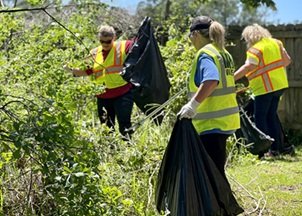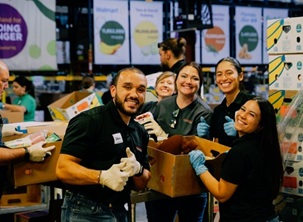
TAMPA, FLA.—With roots going all the way back to 1926, McKibbon Hospitality has a long history of developing and managing hotels. Along the way, the company has guided hotels representing all the major brands through their sustainability initiatives—saving energy, water and reducing waste while building a culture of community and giving.
For almost three years, Rafael Ibarcena has led McKibbon Hospitality’s Corporate Social Responsibility program. Green Lodging News interviewed Ibarcena, the company’s Corporate Sustainability Manager, to learn about the unique leadership and services McKibbon Hospitality provides and how it interacts with each brand’s own sustainability initiatives. The following are the results of that interview.
- How many hotels does your company currently manage?
Our portfolio is constantly changing, but as of June 25, 2025, we manage 97 hotels and 10 restaurants.
- Does your company’s sustainability initiative have a formal name?
McKibbon Corporate Social Responsibility (CSR).
- Explain how your company interacts with hotels whose brands already have them participating in sustainability programs. Does your company help those hotels carry out the brand-specific initiatives? If so, can you give me an example or two?
McKibbon Hospitality works closely with hotels that are already participating in brand-specific sustainability programs. Our goal is to support and enhance those existing initiatives, not replace them. We align our services and solutions with each brand’s sustainability framework to ensure compliance, effectiveness, and ease of implementation.
For example, suppose a hotel brand is committed to reducing single-use plastics as part of its brand-wide policy. In that case, we assist the individual property in sourcing approved alternatives, training staff on proper usage, and tracking progress toward corporate benchmarks. In another case, we supported a hotel chain in its carbon reduction efforts by helping individual properties implement energy-efficient systems, providing data tracking tools, and generating reports that directly feed into the brand’s broader ESG reporting requirements.
Our collaborative approach enables hotels to achieve brand goals while also tailoring solutions to local needs and conditions.
- Your company brings its own expertise to the table as well? Explain what that expertise is and give me some examples. What are you most commonly helping hotels with?
McKibbon Hospitality is one of the leading hotel management companies in the U.S. Our company’s team brings a deep understanding of how to optimize operations, extend asset life cycles, and reduce costs—all while supporting sustainability goals. Our company leverages that expertise to help hotels operate more efficiently and meet brand or regulatory standards. We most commonly assist hotels with implementing preventive maintenance programs, improving energy and water efficiency, and ensuring compliance with sustainability reporting requirements. For example, we’ve helped properties conduct asset condition assessments to prioritize capital investments and avoid unexpected failures. In another case, we guided a hotel through the process of transitioning to LED lighting and smart thermostats, resulting in a significant reduction in energy consumption and utility costs. Our work combines engineering precision with practical, on-the-ground hotel operations expertise, making our solutions both practical and sustainable over time.
- What energy management initiatives has your company found to be most effective at reducing impact and related costs?
Some effective energy management initiatives for hotels focus on lighting and HVAC systems, which are the biggest energy consumers in the hospitality industry.
- LED Lighting Upgrades: Switching old incandescent or fluorescent lights to LEDs has shown quick returns. In a 150-room hotel, this reduction in lighting energy use resulted in over a 60 percent decrease and saved approximately $18,000 per year.
- Smart Thermostat Integration: Installing smart thermostats with occupancy sensors has resulted in a 20 to 25 percent reduction in HVAC energy use during periods of low occupancy, thereby saving costs and extending equipment life.
- Centralized HVAC Optimization: Implementing energy management systems allows for real-time HVAC monitoring. This system helped a property save thousands annually by reducing peak demand charges.
These initiatives are selected based on each hotel’s specific needs and demonstrate an immediate impact on energy savings.
- What water conservation initiatives has your company found to be most effective at reducing impact and related costs?
The most effective water conservation efforts in hotels combine technology upgrades with operational changes, resulting in lower environmental impact and utility costs with short payback periods.
One way to conserve water is by installing low-flow fixtures, such as showerheads and toilets, which can reduce water usage by 35 percent in a limited-service hotel, resulting in savings of over 500,000 gallons and more than $10,000 annually.
Laundry systems can be optimized by utilizing ozone systems and adjusting wash cycles, resulting in a 25 percent decrease in water usage, improved linen durability, and reduced chemical use.
Outdoor water use can also be reduced with advanced irrigation systems that adjust based on weather conditions. In a hotel with extensive landscaping, switching to drought-tolerant plants and using drip irrigation cuts outdoor water usage by over 50 percent.
Implementing real-time water monitoring can help detect leaks early, saving significant costs. These initiatives not only reduce water bills but also support sustainability goals and enhance guest satisfaction.
- What waste management initiatives have your company found to be most effective at reducing impact and related costs? Are there any brands still offering single-use amenity bottles?

While collaborating with leading hotel brands such as Marriott, Hilton, and Hyatt, we have discovered effective waste management strategies that not only support sustainability goals but also reduce costs.
One significant change is moving from single-use plastic toiletry bottles to bulk amenity dispensers. Switching to bulk amenities could reduce plastic waste by up to 250 pounds per year for every 100-room hotel.
Another key initiative is food waste diversion. By tracking and composting food waste, we save on disposal and food costs. Additionally, we help hotels establish recycling programs with guestroom bins and staff training, which has significantly improved recycling rates in some properties.
Lastly, we partner with suppliers to minimize packaging during deliveries, which has also helped reduce waste. Most hotel brands in North America have phased out single-use amenity bottles, although some exceptions remain.
- Do any of your managed properties employ renewable energy technologies? If so, tell me more. How often does carbon offsetting come into play?
Currently, our managed properties do not utilize renewable energy technologies, such as solar, wind, or geothermal systems. However, we fully recognize the importance of transitioning to cleaner energy sources and are actively evaluating opportunities for future implementation. Carbon offsetting also comes into play, particularly in cases where complete decarbonization on-site isn’t immediately feasible. We typically recommend offsets as a complement to energy reduction efforts, not a replacement.
- How prevalent are EV charging stations? Which brands have been most aggressive in this area?
EV charging stations are increasingly found at hotels in the U.S. due to the rising number of electric vehicle (EV) drivers and travelers who prioritize sustainability. Major hotel brands, such as Marriott, Hilton, Hyatt, and IHG, are expanding charging availability, with many new hotels incorporating EV infrastructure and existing ones adding it in high-traffic areas.
By 2025, over 25 percent of mid- to upscale hotels are expected to have at least one EV charging station, particularly in states like California, New York, Texas, and Florida. Tesla has partnered with many hotels to provide Destination Chargers at no upfront cost. Level 2 chargers are the most common, allowing overnight charging, while DC fast chargers are found at larger hotels.
Guest expectations are growing, especially among business travelers. Some hotel brands are now requiring new franchisees to include EV charging in their plans, promoting it as part of their sustainability efforts and on booking platforms. Offering EV charging is becoming a competitive amenity and a revenue opportunity for hotels.
- Explain how your company is helping owners with goal reaching—hotels that are part of brands that are trying to meet a certain level of carbon reduction by a certain year.
Our company helps hotel owners achieve carbon reduction goals that align with corporate sustainability strategies. Hotel brands, such as Marriott and Hyatt, aim to reduce emissions by 27 percent to 30 percent from their baseline by 2030. We support these efforts in key ways:
- We support third-party companies conducting energy audits to find inefficiencies and establish a baseline for carbon emissions, which helps align hotel performance with brand sustainability goals.
- We implement cost-effective solutions, such as LED lighting, smart thermostats, and energy management systems, to reduce energy use and emissions with minimal investment.
- We assist hotel teams in gathering and organizing energy data for accurate tracking and compliance with brand reporting systems and certifications such as Green Key Global. Additionally, the sustainability department ensures that hotels adhere to the Building Performance Standards (BPS) ordinances mandated by cities and states by utilizing the EPA Energy Star Portfolio Manager platform to share their data on an annual basis.
- For long-term upgrades, we offer guidance on evaluating significant investments to align with carbon targets and financial feasibility.
- We promote a sustainable culture by training hotel staff on energy-saving practices to reduce emissions further.
These efforts enable hotel owners to meet brand expectations while making significant progress in reducing carbon emissions.
- Talk about the role of AI in sustainability initiatives.
Artificial Intelligence (AI) plays a transformative role in promoting sustainability within the hospitality industry by enhancing efficiency and facilitating data-driven decision-making. For example, AI-powered energy management systems can analyze real-time data on occupancy, weather patterns, and historical usage to optimize heating, ventilation, and air conditioning (HVAC) systems, as well as lighting and other systems. This optimization process significantly reduces energy consumption and carbon footprints.
Artificial Intelligence can also revolutionize waste management by tracking waste generation patterns, identifying recycling opportunities, and optimizing food inventory to minimize spoilage. Furthermore, it contributes to water conservation through the use of smart sensors and meters that detect leaks and monitor water usage, thereby preventing waste and mitigating damage.
By providing actionable insights and automating resource management, Artificial Intelligence enables hotels to not only reduce their environmental impact but also achieve significant cost savings, aligning profitability with eco-friendly best practices.
- McKibbon Hospitality has embedded sustainability into every aspect of its operations. Give me some examples outside of what is typical. Where does it come into play in employee training, for example?
 McKibbon Hospitality’s “Love Your Community” principle emphasizes the importance of social well-being and community impact as part of sustainability. This principle embodies a broader approach to Corporate Social Responsibility (CSR) that focuses on human capital and local communities.
McKibbon Hospitality’s “Love Your Community” principle emphasizes the importance of social well-being and community impact as part of sustainability. This principle embodies a broader approach to Corporate Social Responsibility (CSR) that focuses on human capital and local communities.
McKibbon University is McKibbon Hospitality’s internal training platform, not a traditional degree-granting institution. It supports employee growth through structured on-the-job training and development, offering specialized classes, workshops, and an annual leadership conference. The goal is to encourage unlimited growth and promote from within. A significant feature is the “McKibbon Manager-in-Training Program,” which prepares employees for leadership roles. Additionally, McKibbon University partners with universities such as the University of South Florida and Florida International University to offer experiential learning opportunities.
- What about supply chain issues? To what degree does your company screen suppliers based on progress in sustainability?
McKibbon Hospitality addresses supply chain issues through a clear procurement strategy focused on responsible sourcing and sustainability. We have a dedicated Procurement team within our Operational Excellence department, led by Vice President of Operational Excellence Jess Hayden, which is responsible for sourcing, contract negotiations, payment terms, and ensuring that the right supplies are obtained at a cost-efficient rate. A crucial part of their strategy is building strong vendor relationships and carefully selecting suppliers for their hotels and restaurants.
Their sustainable sourcing strategy is managed by the operational excellence team, aligning procurement with broader sustainability goals. They emphasize operational efficiency to streamline processes and reduce waste in procurement and inventory management. Additionally, their partnership with Procure Impact helps them select suppliers focused on social good, thereby enhancing their commitment to sustainability.
- Does your company help owners identify rebate/tax incentive opportunities?
McKibbon Hospitality helps hotel owners find rebates and tax incentives through their partnership with INCENTIFIND. This collaboration is beneficial for owners because it provides specialized expertise in navigating complex incentives related to energy efficiency, sustainability, and property improvements from various programs. INCENTIFIND has the knowledge to identify and secure these incentives, making it easier for hotel owners to access potential savings.
The partnership actively identifies opportunities, such as energy efficiency rebates for system upgrades, water conservation incentives, renewable energy tax credits, and other incentives tailored to specific locations. This partnership helps maximize financial returns by reducing costs and improving property profitability. Additionally, the partnership streamlines the application process, allowing McKibbon to manage research and follow-up, making it less burdensome for owners.
- In what ways is your company working with NGOs and local governments?
McKibbon Hospitality shows a strong commitment to social impact that goes beyond traditional corporate giving. Our approach is guided by the “Love Your Community” principle, with a focus on integrating community support into our business. Our company has established the McKibbon Hospitality Foundation to allocate a significant portion of its profits to charitable activities that aim to help others.
Our company fosters a culture of giving among its employees, encouraging them to volunteer and raise funds for local nonprofit organizations. Our Matching Funds Program supports this by matching money raised during hotel events. We collaborate with local NGOs, such as Clothes to Kids in Tampa, to address specific community needs while enhancing the impact of donations.
Additionally, McKibbon Hospitality actively engages with local governments in real estate development and community plans, participating in discussions that improve local environments and economies. Our company advocates community development initiatives, such as public art installations and legislative changes to secure local infrastructure funding.
- Are any properties approaching zero carbon? What are you hearing about zero carbon? Carbon positive?
McKibbon Hospitality demonstrates a strong alignment with the World Sustainable Hospitality Alliance’s “Pathway to Net Positive Hospitality” framework through its holistic and proactive approach to environmental and social responsibility. The Alliance’s framework emphasizes moving beyond merely minimizing negative impacts to actively creating positive contributions across people, planet, place, and prosperity.
By aligning with the World Sustainable Hospitality Alliance framework, we aim to achieve net zero by 2050.
- Does your company have any idea of what impact it has had through Clean the World?
Since launching our partnership with the Clean the World program in 2009, our company has made a significant impact on both the environment and various communities. Here are some metrics highlighting our contributions:
- 30,000+ pounds of soap collected.
- 185,000+ bars of soap distributed.
- 3,000 hygiene kits supported.
- 28,000+ people served.
- 8,000 refugees served.
- 19,000 kgCO2e carbon footprint reduction.
- 31,000+ pounds of plastic collected.
- 61,000+ pounds of waste collected.
- 100,000+ gallons of water saved.
- To what degree is your company sourcing products using Procure Impact? Do you know how many shift hours your company has helped create?
McKibbon leverages its purchasing power to create social impact. Our partnership with Procure Impact and commitment to the Dignity of Work Pledge means we actively source products from social enterprises that employ and support “overlooked populations” (e.g., refugees, veterans, individuals with disabilities, those overcoming addiction or homelessness). This partnership directly creates meaningful employment hours and economic opportunity. To date, our hotels have placed 239 total orders, generating 1,176.4 total impact hours.
- To what degree does McKibbon assist hotels with green certification? Is there a particular certification program you are most recommending?
McKibbon Hospitality demonstrates a significant and systematic commitment to assisting hotels with green certification, proactively integrating sustainability into their development and operational standards. While our company has historically pursued various certifications, our current approach indicates a strong preference for building-level certifications and setting high minimum standards.
Due to the agreement reached in 2024 between the American Hotel and Lodging Association (AHLA) and the Hotel Association of Canada, the Green Key Global sustainability certification program has been expanded in both Canada and the United States through a business partnership.
Green Key Global is a North American environmental certification body for the hotel and lodging industry. Green Key’s certification criteria are recognized by the Global Sustainable Tourism Council (GSTC) and aligned with all 17 of the United Nations’ Sustainable Development Goals (UNSDGs). Properties receive an eco-rating through a rigorous assessment and audit process that measures hotel performance in several key areas, including energy and water conservation, land use, hazardous and solid waste management, and air quality.





